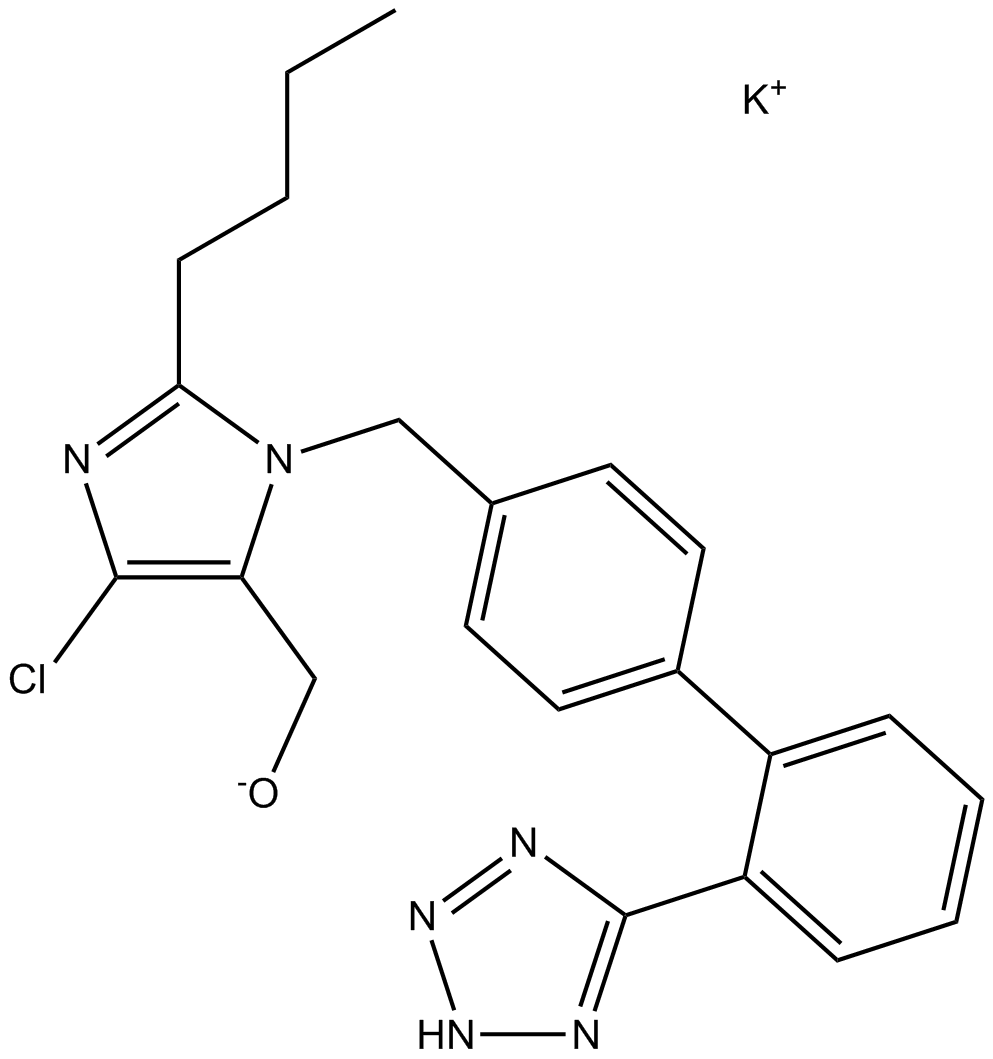Losartan Potassium (DuP 753) (Synonyms: DuP753, MK 954) |
| Catalog No.GC10257 |
Losartan Potassium (DuP 753) (DuP-753 potassium) is an angiotensin II receptor type 1 (AT1) antagonist, competing with the binding of angiotensin II to AT1 with an IC50 of 20 nM.
Products are for research use only. Not for human use. We do not sell to patients.

Cas No.: 124750-99-8
Sample solution is provided at 25 µL, 10mM.
Losartan (potassium) is an angiotensin II receptor type 1 (AT1) antagonist, competing with the binding of angiotensin II to AT1 with an IC50 of 20 nM.
Losartan competes with the binding of angiotensin II to AT1 receptors. The concentration that inhibits 50% of the binding of angiotensin II (IC50) is 20 nM[1]. Losartan (40 μM) affects ISC but prevents the effect of ANGII on ISC[2]. Losartan significantly reduces Ang II-mediated cell proliferation in endometrial cancer cells. The combination of losartan and anti-miR-155 has a significantly greater antiproliferative effect compared to each drug alone[3].
Losartan (0.6 g/L, p.o.) -treated Fbn1C1039G/+ mice show a reduction in distal airspace caliber relative to placebo-treated Fbn1C1039G/+ animals. The doses of losartan and propranolol are titrated to achieve comparable hemodynamic effects. Analysis of pSmad2 nuclear staining reveals that losartan antagonizes TGF-β signaling in the aortic wall of Fbn1C1039G/+ mice. Losartan can improve disease manifestations in the lungs, an event that cannot plausibly relate to improved hemodynamics[4]. Losartan (10 mg/kg, intraarterial injection) increases blood angiotensin levels four- to sixfold. Losartan (10 mg/kg, i.p.) increases plasma renin levels 100-fold; plasma angiotensinogen levels decreases to 24% of control; and plasma aldosterone levels are unchanged[5].
Reference:
[1]. Burnier, M. Angiotensin II type 1 receptor blockers. Circulation, 2001. 103(6): p. 904-12.
[2]. Ashry, O., et al. Evidence for expression and function of angiotensin II receptor type 1 in pulmonary epithelial cells. Respir Physiol Neurobiol, 2014.
[3]. Choi, C.H., et al. Angiotensin II type I receptor and miR-155 in endometrial cancers: synergistic antiproliferative effects of anti-miR-155 and losartan on endometrial cancer cells. Gynecol Oncol, 2012. 126(1): p. 124-31.
[4]. Habashi, J.P., et al. Losartan, an AT1 antagonist, prevents aortic aneurysm in a mouse model of Marfan syndrome. Science, 2006. 312(5770): p. 117-21.
[5]. Campbell, D.J., et al. Effects of losartan on angiotensin and bradykinin peptides and angiotensin-converting enzyme. J Cardiovasc Pharmacol, 1995. 26(2): p. 233-40.
Average Rating: 5 (Based on Reviews and 35 reference(s) in Google Scholar.)
GLPBIO products are for RESEARCH USE ONLY. Please make sure your review or question is research based.
Required fields are marked with *




















